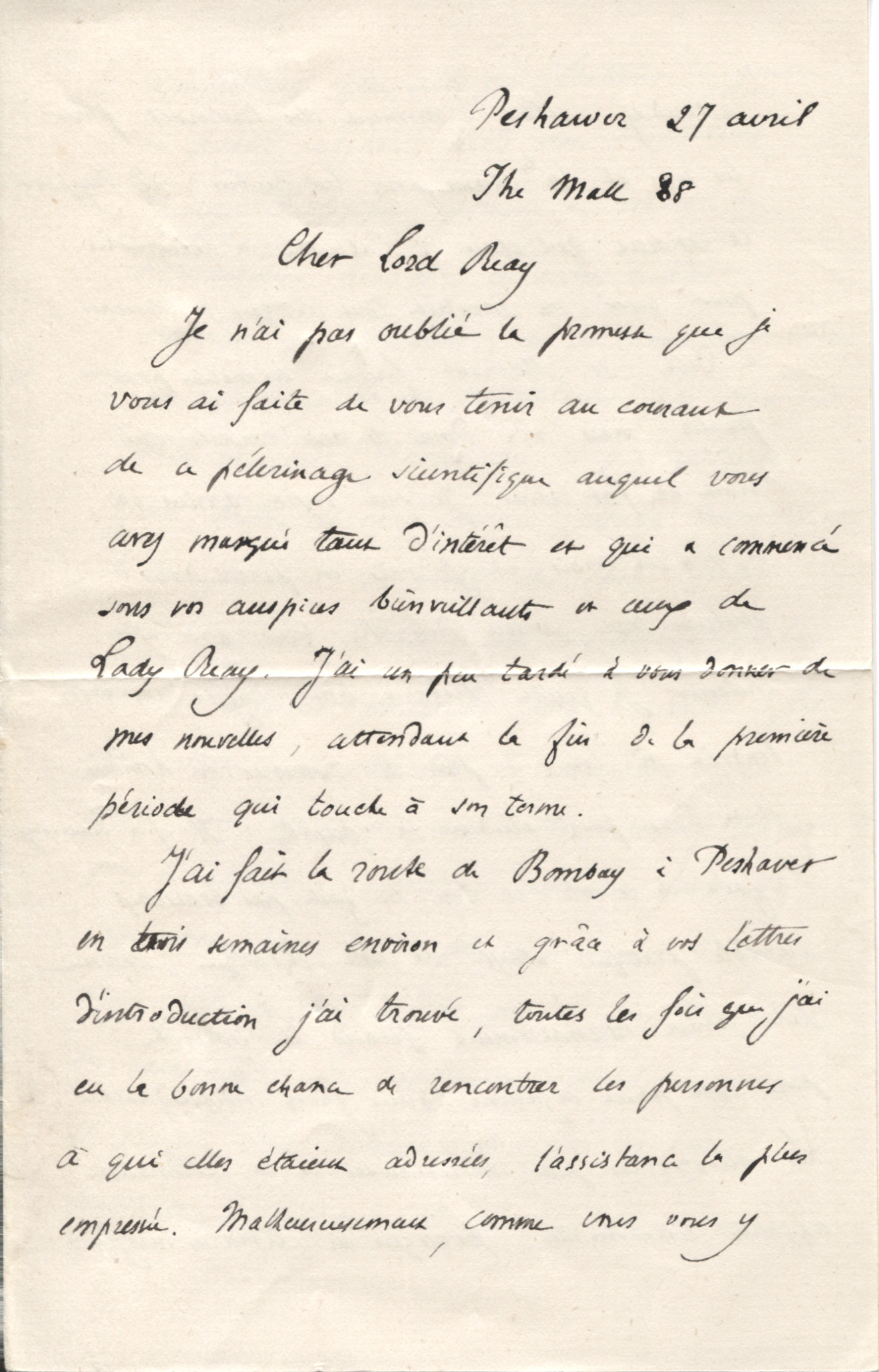
DARMESTETER
(James, 1849-1894, French Author, Orientalist and Antiquarian)
Important Long Autograph Letter Signed to Lord REAY
(Donald James Mackay, 1st Baron Reay, 11th Lord, 1839-1921, Dutch born British Administrator and Liberal Politician) saying that he has “by no means forgotten my promise to keep you informed of this scientific pilgrimage, in which you have taken such kind interest and which began under the gracious auspices of Yourself and Lady Reay. I have been somewhat slow in writing, choosing to wait until the close of this first phase of my journey — a moment which is now approaching. My travels brought me from Bombay to Peshawar in the span of about three weeks, and thanks to your letters of introduction, I received the most generous welcome whenever I was fortunate enough to encounter their intended recipients. Unfortunately — though perhaps as you anticipated — it was the season of tours for some and hunting trips for others. In Jaipur, the Resident was in Calcutta, yet he telegraphed to ensure that every facility was offered to me. In Delhi, Mr. MacNabb was preparing to depart, but nonetheless provided valuable guidance that has since served me well. I arrived in Peshawar a month ago and shall leave in a few days, driven away by the advancing heat. I go with genuine regret, for there is no place richer in resources — both in people and in books — for the study of Pashtu. There is much to be accomplished here, and yet so little is being done: the practical demands of administration consistently stifle theoretical pursuits, as inevitably occurs when pure research lacks independent support. The most intriguing works of Afghan literature remain unpublished, for local printers cater only to popular tastes — Persian or Arabic theological treatises, or Hindi tales. Everything else lies neglected and too often disappears entirely, for manuscripts are rare, and their custodians regrettably careless. Only a few days ago I believed I had stumbled upon a scholarly treasure: the Pashtu correspondence between the Afridi chiefs and Emperor Akbar — the very period in which that renowned tribe first emerges in history. The papers were said to be in the possession of an elderly mullah, whose ancestor served as Akbar’s secretary for Afghan affairs. But upon inquiry, I learned that the documents had been lost — or destroyed — some years ago, as they were falling to pieces. Had the scientific exploration of this frontier been better organised, had candidates for the Pashtu examinations been motivated by anything beyond prize money or the ability to converse with a munshi, such documents would long since have been edited, translated, and preserved. Missionaries might also contribute greatly; yet here again, practical concerns prevail to the exclusion of all else, at least for now. On my return to Bombay, I would welcome the opportunity to discuss this and other matters of a similar nature with you. Here, I can find no one to whom such criticisms may be usefully addressed — and coming from a foreigner, they might easily be misinterpreted. I am certain this would not be the case with you, whose interest in pure knowledge is as great as if you were neither a statesman nor a man of action. In a few days, I shall take advantage of the last trace of cool weather and travel through the district in search of folk songs. Here — as everywhere among peoples whose literary tradition remains in formation — these songs constitute the most vivid and authentic expression of their culture. I do not yet know where I shall spend the worst of the heat and the rains, though I intend to remain in the North so that I may visit the cities of the Ganges in the autumn. I shall go either to Murree or to Simla, accompanied by a local munshi. This is, I fear, a somewhat selfish letter, in which the first person intrudes too freely; and in France, they say that self is a most detestable thing. But you asked for my impressions, and I trust you will not hold the indulgence against me. My brother has charged me, whenever I write to you, to offer the assurance of his warm and devoted regards. I hope this letter finds you fully recovered, and that Lady Reay is in the best of health...”, 6 sides 8vo., Peshawar, 27th April no year but
Item Date:
1886
Stock No:
43598
£875
Add to Wish List
Order/Enquire
Full Details
|
|
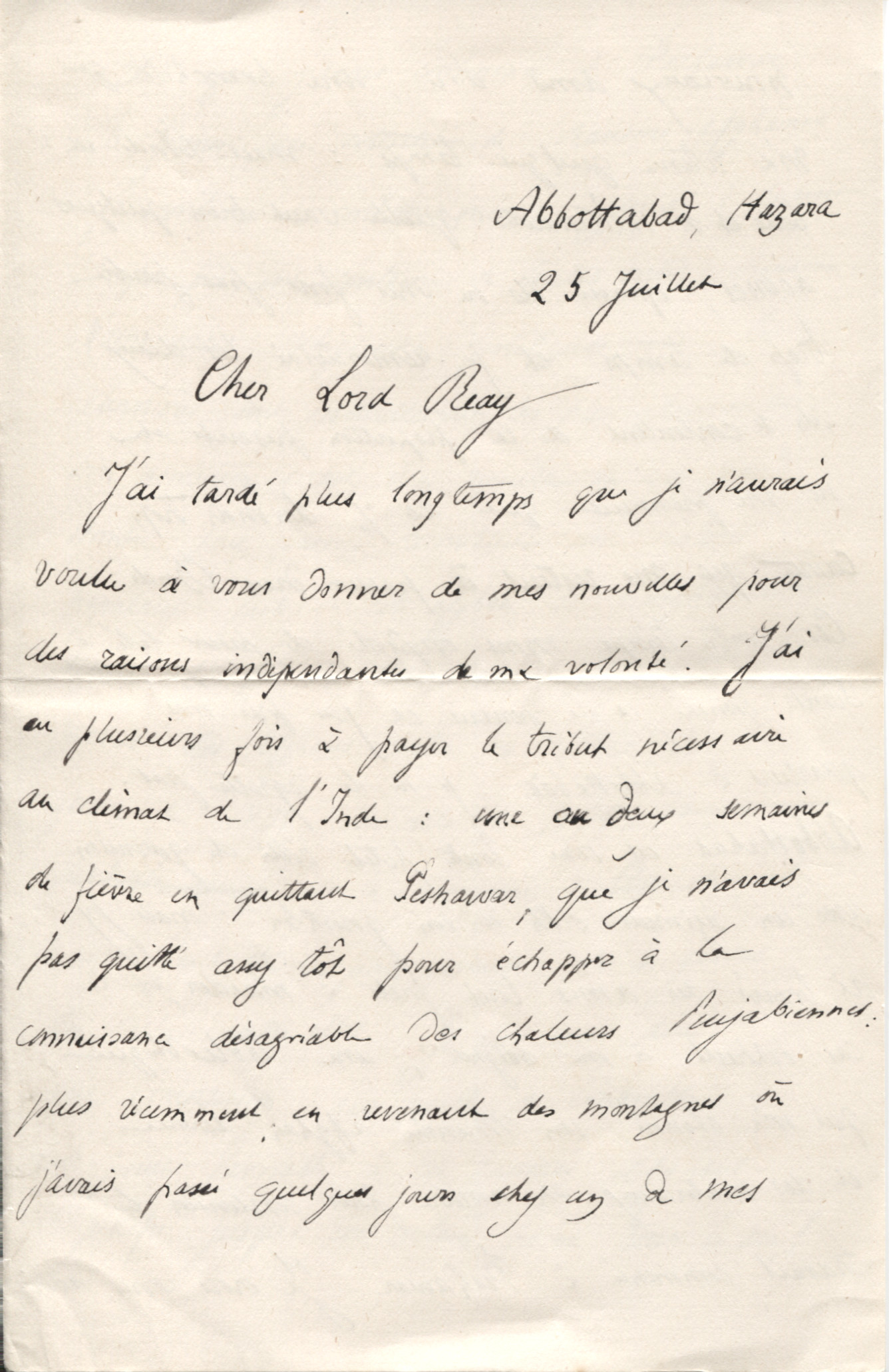
DARMESTETER
(James, 1849-1894, French Author, Orientalist and Antiquarian)
Important Long Autograph Letter Signed to Lord REAY
(Donald James Mackay, 1st Baron Reay, 11th Lord, 1839-1921, Dutch born British Administrator and Liberal Politician) saying that he has “delayed writing to you longer than I would have liked for reasons beyond my control. I have had to pay the necessary price for the Indian climate several times; a week or two of fever upon leaving Peshawar, which I hadn’t left early enough to escape the unpleasant experience of the Punjabi heat; more recently, upon returning from the mountains where I had spent a few days with one of my new friends here, bronchitis kept me here for a while. But India is so beautiful and so interesting that it is well worth a few setbacks, provided they don’t cause too much delay, and I will thank the gods if they are content with the current proportion and only take 20% of the all-too-short months I have left to spend in India. These setbacks prevented me from spending the summer in Simla as I had planned, and I settled in Abbottabad instead; I don’t regret it. Abbottabad is a very small garrison town, with a Sikh regiment and a Gurkha; but I found friends there all ready to help me and, if necessary, to care for me, a library that astonished me, a devoted Afghan Munshi, and plenty of material to continue the work I began in Peshawar. I believe I told you that I started compiling a collection of Afghan songs in Peshawar. I continued and am still continuing; I have about a hundred of all kinds—love songs, religious songs, political songs, and so on. The latter are naturally the most interesting. My ambition would be to collect enough of them to be able to reconstruct a popular history, told from the Afghan perspective, of Afghanistan since the end of the last century. I have accounts of the Afghan wars against the Sikhs, of the 1835 war, of the 1879 war, of the Ambela campaign, and, perhaps the most curious, of the wars between the tribes. I must tell you that the overall impression is not favourable to these poor Afghans and, to a certain extent, justifies all the bad things said about them in English newspapers and books. There is a lack of moral sense and loyalty displayed with a naiveté and recklessness that is not without a certain charm. The literary value of these songs varies greatly; a few are charming, but they are few and far between; the majority are commonplace and clichés. Clichés exist in popular literature as well as in scholarly literature. The authors of these songs are organised into schools; a famous dum has students who begin by learning his songs to sing them in public and who later compose for themselves. I believe that to truly understand what the Gallic bards were like, one would need to spend a few months in the inner circle of the dums. You can see that I am not particularly enthusiastic about my subject, which is, however, the primary duty of a scholar. The collection will be of great interest to philologists, as it will offer a specimen of the actual Afghan language and true literature. Everything written in Afghan consists only of translations from Persian and Arabic and gives no more insight into the genius and language of the people than our translations from Latin and Greek would. I believe, however, that the general public, and especially the English-speaking public, will find some interest in it and perhaps even, through the novelty of it, will discover beauties that have escaped me. I intend to stay here until the end of September. I am obliged, to my great regret, to confine myself exclusively to Pashtu, because once I leave, I will find no further opportunity to continue my collections. Yet, in this little corner of the world, there are so many curious specimens that I will not find elsewhere; not only Sikhs, but also those brave Gurkhas, Mongols who have learned Sanskrit and speak it in their own way, the Dogras, and so many others. But ever since I set foot in India, every step brings the same regret; so many beautiful things to leave behind, so many magnificent opportunities to miss. The story of my journey will be, above all, the story of my sacrifices. From here, I intend to visit the Ganges Valley, making a special stop in Rohilkhan, which was colonised two centuries ago by an Afghan settlement. Sir Alfred Lyall, whose advice I sought on this matter, presenting myself to him under the kind patronage of Lady Reay, advises me to stop in the state of Rampor. It is the only Rohilkhan state that has remained independent, and he is to arrange an introduction for the Nawab there. I will hardly be back in Bombay before the end of November and will have at most three months to give to the Parsis, especially since I would like to take the opportunity to make a trip to Madras and Hayderabad. Truly, it is madness to come to India when one only has a year to give it. One would need at least three years to get even a basic idea of the country. I sometimes hear news of you from the newspapers here, although they seem to think that Punjab is all of India. I read with great pleasure your witty and insightful speech on the education of the Hindus last week...”, 8 sides 8vo., Abbotabad, Hazara, 25th July no year but circa
Item Date:
1886
Stock No:
43599
£975
Add to Wish List
Order/Enquire
Full Details
|
|
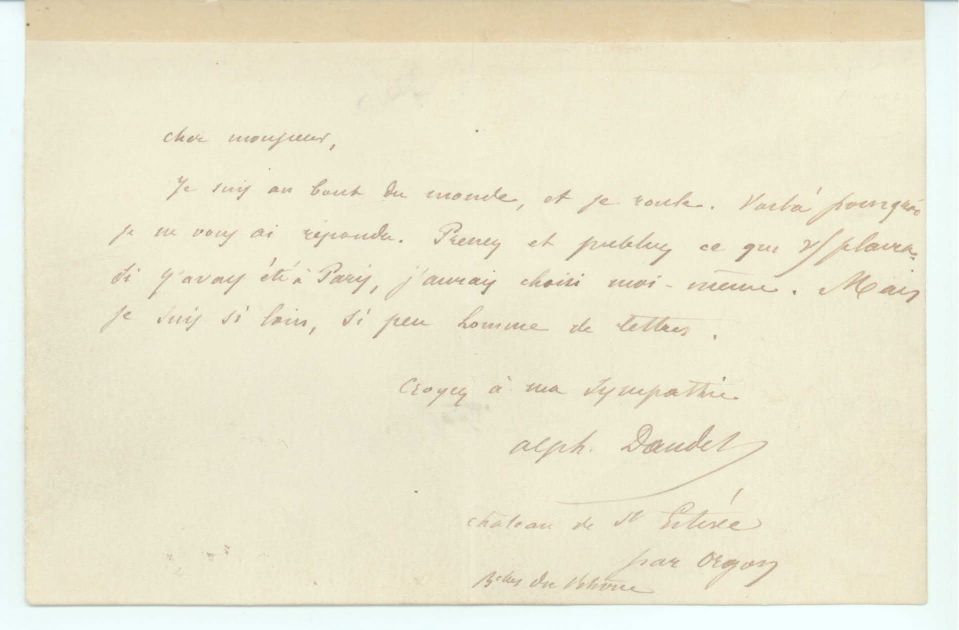
DAUDET
(Alphonse, 1840-1897, French Writer)
Autograph Letter Signed in French to an unnamed correspondent,
explaining that he is away, "au bout du monde ..." and therefore did not answer his letter, asking him to take and publish what he likes as, if he had been in Paris he would have made the choice himself "Mais je suis si loin, si peu homme de lettres", 1 side oblong 8vo., Chateau de St Estére, par Orgon, no date,
Item Date:
0
Stock No:
5882
£140
Add to Wish List
Order/Enquire
Full Details
|
|
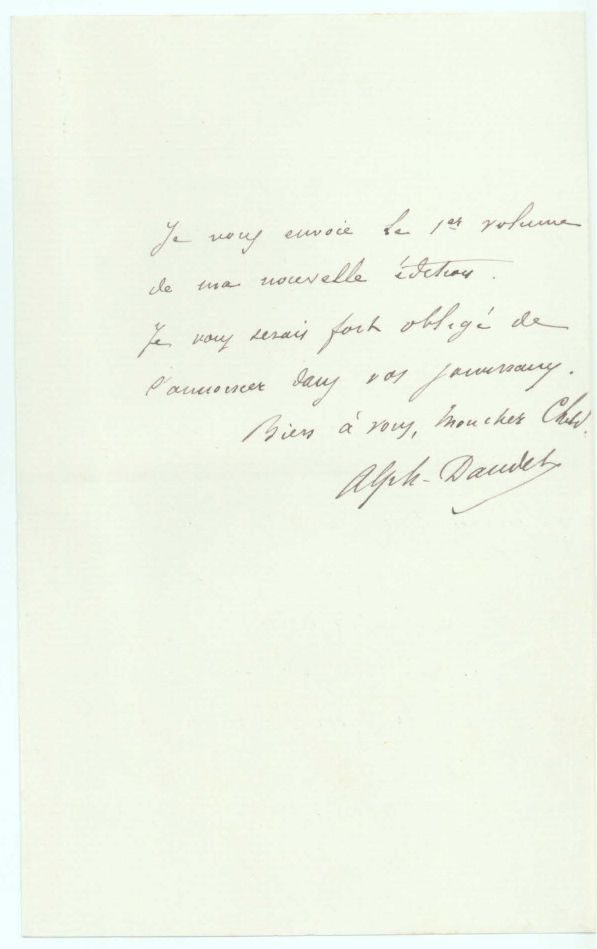
DAUDET
(Alphonse, 1840-1897, French novelist and playwright)
Autograph Letter Signed, in French with translation, to 'Mon cher Child',
saying he is sending "the 1st volume of my new publication. I would be most grateful if you could announce it in your journals", 1 side 8vo., no place, no date, c.
Item Date:
1895
Stock No:
19713
£125
Add to Wish List
Order/Enquire
Full Details
|
|
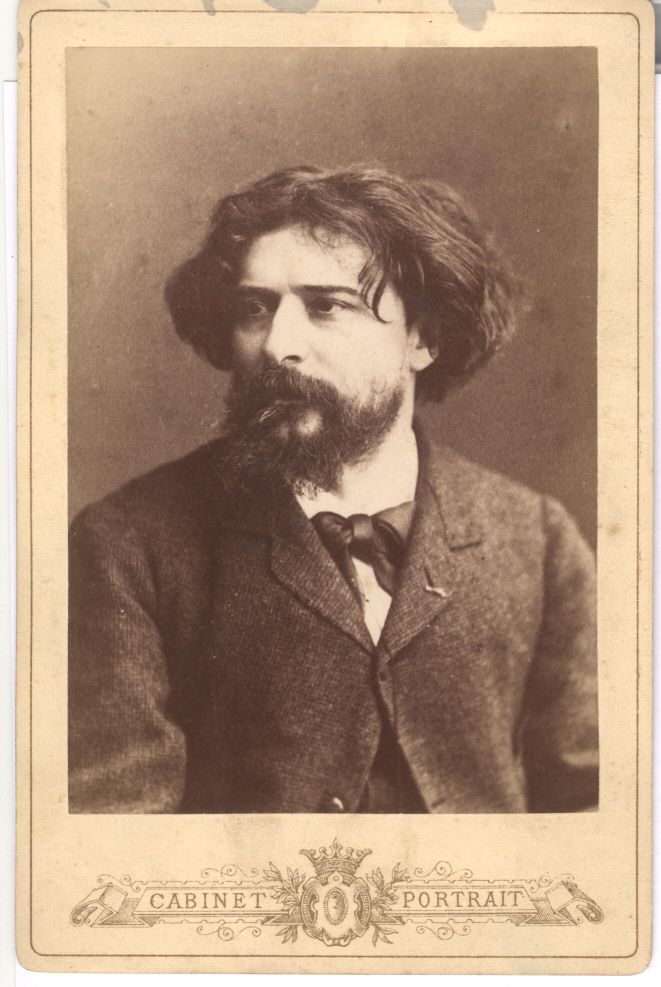
[DAUDET
(Alphonse, 1840-1897, French novelist and playwright)
Fine Unsigned cabinet photo
showing him head and shoulders, looking slightly to one side, 6½" x 4½", no place, no date, circa
Item Date:
1880
Stock No:
38453
£225
Add to Wish List
Order/Enquire
Full Details
|
|